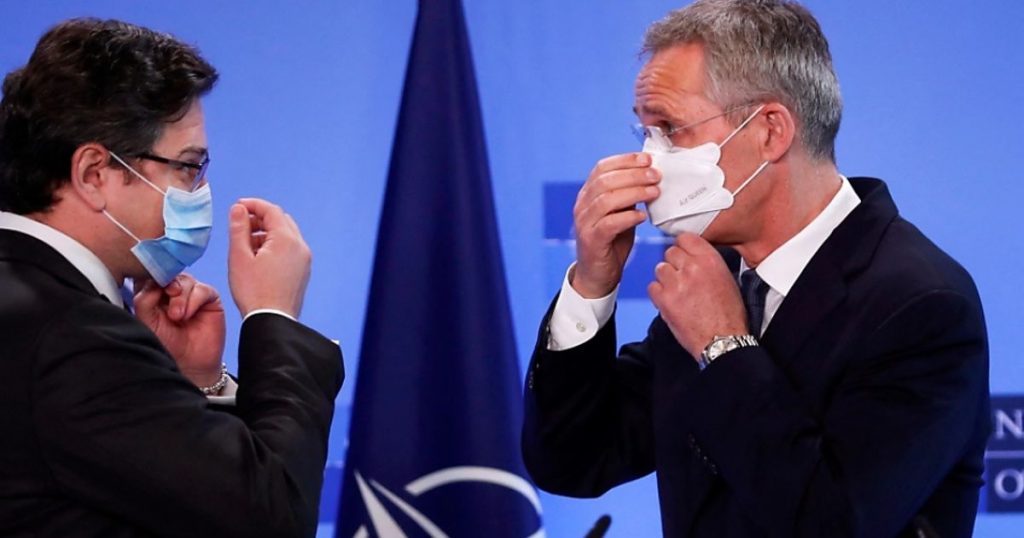NATO is increasingly concerned about developments in the conflict between Ukraine and Russia. NATO Secretary-General Jens Stoltenberg said on Tuesday on the sidelines of a meeting with Ukrainian Foreign Minister Dmitry Koliba in Brussels that the deployment of Russian forces along the border with Ukraine is the largest since the annexation of Crimea in 2014. Russia has accused NATO countries of turning Ukraine into a “barrel.” Gunpowder “with arms shipments.
Russia has transferred thousands of combat-ready soldiers in the past few weeks. The large concentration of the armed forces is “unjustified, unjustified and deeply disturbing”. Stoltenberg called on Russia to end the military deployment and start the de-escalation immediately. It is regrettable that Russia decided not to attend the meeting of the Organization for Security and Cooperation in Europe (OSCE) to allay concerns about extraordinary military activity.
At the same time, the Norwegian promised Ukraine continued support from NATO and NATO members. He said NATO’s support for Ukraine’s sovereignty and territorial integrity is unwavering. For example, training is used to enhance the capabilities of the Ukrainian Armed Forces. However, it remains impossible for the alliance to become actively involved in the conflict. On the other hand, the reason is that Ukraine to this day is only a partner country and not a member of the Defense Alliance. On the other hand, risks are also difficult to calculate. Diplomats say no one can care to risk a third world war over a regional conflict.
For the same reason, Ukraine is also unlikely to be granted NATO membership until the regional dispute is resolved. Such a decision could mean that other NATO countries may have an obligation to help in the event Russia comes under further aggression. Of course, this argument is not official. Instead, NATO is referring to membership requirements that have not yet been met, for example in the areas of rule of law and anti-corruption. “The reforms will bring Ukraine closer to NATO,” Stoltenberg said on Tuesday.
However, Ukrainian Foreign Minister Dmitry Koliba expressed hope for more support. “We need measures to deter Russia and contain its aggressive intentions,” he said. For example, a new round of sanctions may raise the price of Russian aggression. Or there may be direct support to bolster Ukraine’s defense capabilities.
“Some of the measures that we are talking about may seem expensive, but the price of prevention will still be less than the cost of ending the war,” he said. That is why it is best to act now to prevent Russia from escalating further. Koliba also wanted to meet with US Secretary of State Anthony Blinken, who is currently on a trip to Europe, during the day.
Meanwhile, Russia accuses NATO countries of provocations. Russian Defense Minister Sergei Shoigu said that his country will conduct military exercises in the face of the threat posed by NATO. Deputy Defense Minister Sergey Ryabkov indicated in Russian media that two American warships are expected to arrive in the Black Sea in the coming days. “They test our strength, and strain our nerves. It will not succeed.” Ryabkov said the ships should “be kept away from the Crimean peninsula and our coast on the Black Sea.” “It would be better for her.” Accident risk is high. According to media reports, Shoigu said that NATO plans to deploy 40,000 soldiers and 15,000 soldiers near Russian territory. Therefore, exercises will be conducted and the combat readiness of your forces will be checked.
Military doctrine allows Moscow to intervene to protect Russian citizens abroad. Russia has issued more than 400,000 passports in eastern Ukraine. Recently, for the first time, the Russian leadership had publicly threatened to intervene in the conflict if Ukraine began a new military offensive. “Responsibility for the consequences of such a hypothetical escalation will be borne only by Kiev and the Western curators,” Ryabkov said.
In light of the deployment of Russian forces, there is currently a growing international concern that the conflict between Russia and Ukraine could escalate again. This resulted in pro-Moscow separatists controlling parts of eastern Ukraine in Donetsk and Luhansk along the Russian border for nearly seven years. Russia has already annexed the Crimea peninsula on the Black Sea, which has a population of more than two million people.
According to United Nations estimates, more than 13,000 people have been killed as a result of the fighting. In the past few weeks, there have been frequent fatal accidents in eastern Ukraine despite the ceasefire agreement. On Tuesday, according to the Ukrainian army, a soldier was killed in the Donetsk region near Margorsky when a grenade was dropped from a drone and two other soldiers were wounded. In the separatist Luhansk region, according to the local army, a fighter was killed by a sniper fire near Solot 5. Initially there was no independent confirmation of either of the two reports. Since the start of the year alone, there have been more than 50 deaths from both sides.
The reason for the recent escalation of tensions is explained differently. In NATO, among other things, the hypothesis is being advocated that Kremlin President Vladimir Putin wants to test the extent of the new US government’s support for Ukraine. Another terrifying scenario is that Russia could plan a major offensive with the rebels in eastern Ukraine to secure access to the North Crimean water channel to the Dnieper River. In Moscow, among other places, the thesis was put forward that Russia only reacts to Kiev’s provocations. Ukraine wants to persuade NATO, especially the USA, to do more in the struggle in order to increase pressure on Russia.

“Food practitioner. Bacon guru. Infuriatingly humble zombie enthusiast. Total student.”







More Stories
KaDeWe stops selling meat and sausages
Another earthquake near the giant Naples volcano
Trump wants to block Harris' access to donations